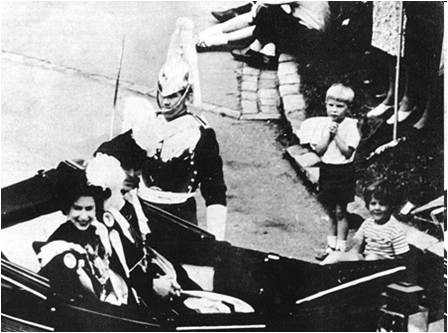|
Plinio Corrêa de Oliveira
The Admiration of the "Golden" Boy
|
|
|
This is a scene from an Italian magazine showing the queen of England riding in a carriage, dressed in the insignias of the Order of the Garter. The carriage is being pulled by horses and she is in grand ceremonial dress… There’s a hat with a feather and you can see the general lines of the carriage. And next to her there is a magnificent royal guard. See the breastplate, the helmet, the plume, the sword, and a large sleeve by way of a glove reaching halfway up his arm. There is a boy and a girl. The boy’s posture contrasts with that of the girl. In fact, let’s first analyze the girl. The girl is looking on with good will. But she is looking at the queen with an innocent worldly gaze, if one can conjugate innocent with worldly. She is looking from the point of view of fashion and beauty. She has the natural vanity of a girl and she is interested, you could almost say enthused, by the consideration of the queen. But she is laughing and enjoying herself. The boy has a profoundly different attitude. He has a profoundly contemplative attitude. He is enchanted with the queen. He is a simple boy of the people and not accustomed to posturing. His attitude is spontaneous—he involuntarily took on the attitude of prayer. He literally has his hands folded before the queen. He has an indescribable gaze of reverence, of respect together with affection and he is analyzing the queen profoundly. All his attention is focused on everything surrounding the queen and you can see that it is an enchantment, a lofty admiration full of veneration and tenderness toward the institution of royalty. It is not an “enlevo” for the person of the queen. It is an enchantment for the institution of royalty. He wants to see and ponder all this glory and all the splendor of the institution. It is something metaphysical. He sees that there is something in life that greatly transcends his ambience. It greatly transcends his day to day life. It greatly transcends the everyday vulgarity and mundane life of men. It is the monarchical structure, a reflection of God on earth, a manifestation of extremely high metaphysical values expressed in pomp and royalty. And this enchants him. He is absorbing and feasting on everything the queen is expressing.
The Order of the Garter is an order of chivalry founded by Edward III in 1348 and regarded as the most prestigious British order of chivalry in England and the United Kingdom. The Late Queen Elizabeth II, June 2008, with the Ceremonial robes of the Order of the Garter. You can see this by his concentration. Look at him. See how attentive he is. See how he has his gaze fixed on the queen. Look at his face. A child in front of a nativity scene would have the same attitude. The expression on his face and in his eyes is a mixture of contemplation and prayer. Why contemplation and prayer? Because he was placed before something called royalty (i.e., majesty). This enchantment is the basis for unpretentiousness, true humility. He is not thinking about himself at all. He has completely abstracted from himself. He is only thinking about royalty. You will see this better in the slide of the boy we will see now. Here you have the boy. One would say that if there were a saint passing in front of him, he would have the same attitude. You see the seriousness in his facial expression. You see his attentive, contemplative gaze and the attitude of prayer conjugated with the attitude of affection. He’s a boy who doesn’t want to be king. He doesn’t want any benefit for himself from royalty. He doesn’t want to shine because of royalty. He gives thanks because royalty exists and because it has beauty and splendor. Look at the girl. She perceived that she was being photographed and is posing. It is mundane and pretentious. She is all excited with the queen, the fashion, everything. If you were to tell her that she could be queen, she would be all giddy and happy. If you were to tell the boy that he was to be king, he would be shocked. He’s not in the least interested in being king. He wants that there be a king, which is very different. Here you have a good image of unpretentiousness, of a person who sees something that is not himself and becomes entirely enchanted with the grandeur of something that is not himself. It is because of the thing itself. It’s what you have in the Gloria during Mass: Gratias agimus tibi propter magnam gloriam tuam. We give Thee thanks because of Thy great glory. This boy could say to the queen: “Your majesty, I give thee thanks. I am grateful to thee that thou art the queen.” Nothing else.
To see just how just this attitude it is enough to remember the famous thought of St. Therese of the Child Jesus regarding Our Lady. She said about Our Lady something along these lines, “Mary, I love thee so much that if I were the queen of heaven and thou wert Therese, I would want to be Therese so that thou wouldst be the queen of Heaven.” Completely unpretentious, immersed in lofty admiration. That is the position of this boy. Compare this to the university student riots—Sorbonne, Berkeley, etc. It’s a total contrast. But here you can see the attitude of the boy very well. Isn’t it an impressive attitude of prayer? It is unquestionably an attitude of enchantment. He would be shocked if he were to know that somewhere, in a place he might not even know exists, called São Paulo, they made a slide of him. It would be the surprise of his life. He wouldn’t understand. He would say, “But obviously, the queen was there. It’s the only position I could have taken.” On the other hand, the girl would be jubilous knowing that her slide was projected. Why? Because she’s foolish, pretentious, vulgar, silly, and daft. Not him! He has a truly elevated and superior soul. I have nothing to add. What this face expresses is indescribable. Here you have an overview of what the spiritual childhood is. When you compare childhood, youth, middle age, elderly age, each one of these ages has there own splendor and each one has their own shame, their own caricature. When we speak of infancy, when the Gospel speaks about becoming like the little child, it is talking about the child who is still disinterested and unselfish, the child who is still capable of tender veneration, the child with idealism: the opposite of the man who has fallen into the sin of pretentiousness, the sin of pride and who is only worried about himself, the egotistical man. So, the spiritual infancy is, primarily, to have this soul. Our Lord said: “Allow the little ones to come unto me because theirs is the kingdom of heaven.” And he said whomsoever was not like them would not enter Heaven. Of course, this doesn’t mean that when you become an adult, you necessarily become vulgar and acquire the soul of a mercenary. That’s not what it means. But it does mean there is a time when this innocence shines the most and only those who keep there souls in that state and grow in that until the end of their days will go to Heaven. Those are the ones who go to Heaven. It was Our Lord who spoke those words. And this is the basic fundamental idea of spiritual infancy. It is this enthusiastic idealism, this idealism for the things that in fact deserve this elevation.
One would think this was a recent photo of CHOP/CHAZ in Oregon or Washington, but this was the Sorbonne demonstrations of May 1968 in Bordeaux (Gironde, France) – on Rue Paul-Bert. A Communist would fall over himself laughing at this soul. He would say that that soul is an alienated soul. What does alienated mean here? Alienus means other. It’s a soul that belongs to another and who is not turned in on himself, on his own advantages and on his own rights. He is turned toward the admiration and service of another. For Communists, this would be the shame of shames. They desire an order of things where none of this exists. What do they want? They love the university riots of Sorbonne and Berkeley. They love filth and dirtiness, disorder, messes, torn clothes, nudity, no organization, the laugh of the devil. The devil hates the spirit of alienation—the spirit of belonging to another, the spirit of this boy—the spirit that Our Lord brought to this earth: “I come not to do My will but the will of My Father who sent Me.” This is a whole perspective of things. I think the apparition in Fatima did something of this with Francisco who was partly converted with the apparitions at Fatima. Because of this, he is a very good patron saint for us. One could pray for this boy but better yet would be to pray for England. The evangelization of England was decided because St. Gregory the Great was walking through the market in Rome and saw some slaves for sale. They were very white and blond, very beautiful and had an angelic quality. And so he asked where these boys were from. They were slaves and had been taken prisoner by the Romans. They told him, “Sunt angli” They are English. And he said, “Non sunt angli, sed angeli”. They aren’t English. They are Angels. And he sent a group led by St. Augustine of Canterbury to evangelize the English. That’s when the English were converted. (Taken from a Saint of the Day meeting given by Plinio Corrêa de Oliveira on Nov. 5, 1968.) |
|






